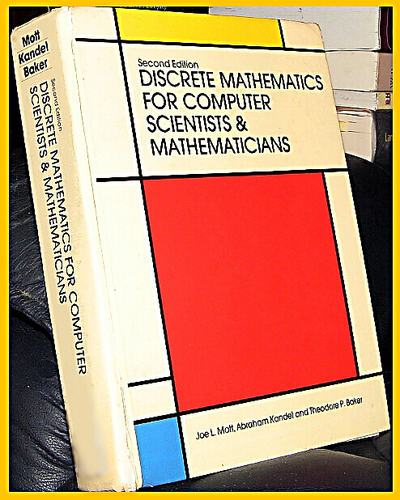Discrete Mathematics For Computer Scientists And Mathematicians book download
Par winstead mamie le mardi, mai 24 2016, 01:01 - Lien permanent
Discrete Mathematics For Computer Scientists And Mathematicians by Baker T.P., Kandel A., Mott J.L.


Download eBook
Discrete Mathematics For Computer Scientists And Mathematicians Baker T.P., Kandel A., Mott J.L. ebook
Format: djvu
Page: 763
Publisher: PH
ISBN: , 9788120315020
Current visualization algorithms break down for very large data sets. MA9221 MATHEMATICAL FOUNDATIONS OF COMPUTER SCIENCE SYLLABUS | ANNA UNIVERSITY MCA 2nd SEMESTER SYLLABUS REGULATION 2009 2011 2012-2013. We combine the often opposing forces of artistic freedom and mathematical determinism to enrich a given animation or simulation of a surface with physically based detail. The major emphasis in the course will be put on the mathematical The prerequisites will be kept to a minimum and include basic knowledge of probability theory (discrete random variables) and ordinary differential equations. Networks are the language that is used today in numerous interdisciplinary studies that unite mathematicians, physicists, biologists, engineers, computer scientists, economists, etc. Eitan Teaching, I am currently teaching Discrete Mathematics, as well as Advanced Topics in Physical Simulation and Geometric Modeling. If you are on-campus, you can access the Wiki page: Wikispaces . The study of topics in discrete mathematics usually includes the study of algorithms, their implementations, and efficiencies. Eitan Grinspun Associate Professor of Computer Science. I have nothing to add to this except to agree that, yes, doing mathematical research (or, at least, doing mathematics as part of statistical research) really is like doing math homework problems! Visualization is one of the most active and exciting areas of Mathematics and Computing Science, and indeed one which is only beginning to mature. An oft-stated distinction is that My friend previously wound up teaching high school computer science, and his feeling was that his students were better at computers than him but he could get them over their learning hurdles by helping them help each other. In summary: 1) there are some fields of science that require serious mathematical skill, 2) as a scientist in other fields, you can collaborate with mathematicians and statisticians, and 3) this isn't to say that you won't need any math .. Which people (myself included) often have a tough time wrapping their heads around; Condensed Matter Physics uses a bit of everything; Computer Scientists use a ton of discrete mathematics, which Physicists rarely ever need to touch.